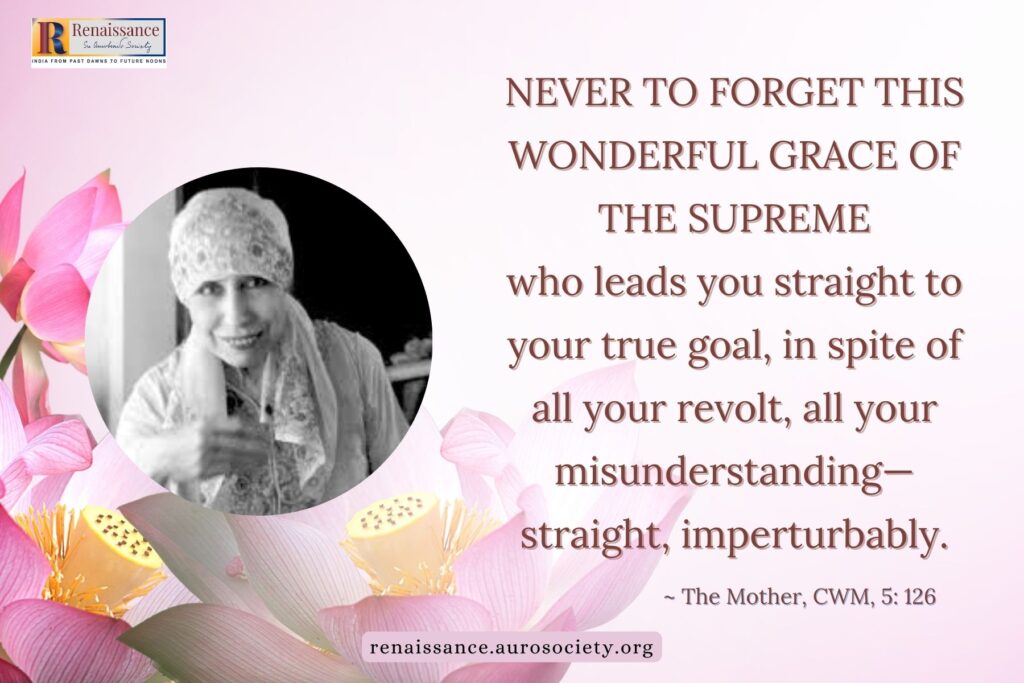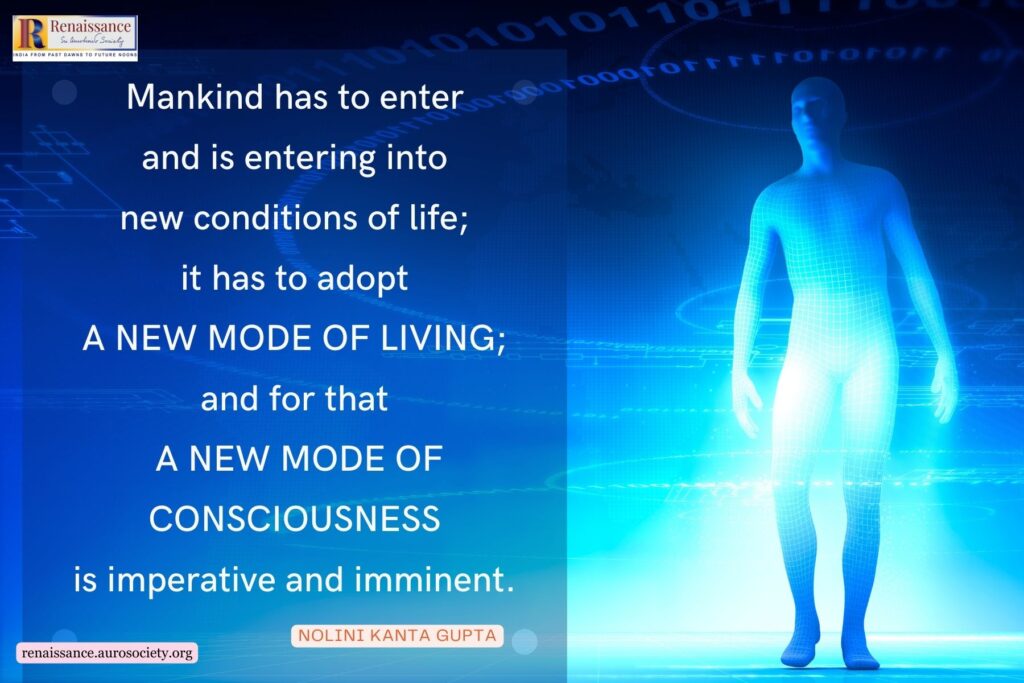Sri Aurobindo belongs to the future; he is the messenger of the future. He still shows us the way to follow in order to hasten the realisation of a glorious future fashioned by the Divine Will.
All those who want to collaborate for the progress of humanity and for India’s luminous destiny must unite in a clairvoyant aspiration and in an illumined work.
(The Mother, CWM, Vol. 13, p. 14)
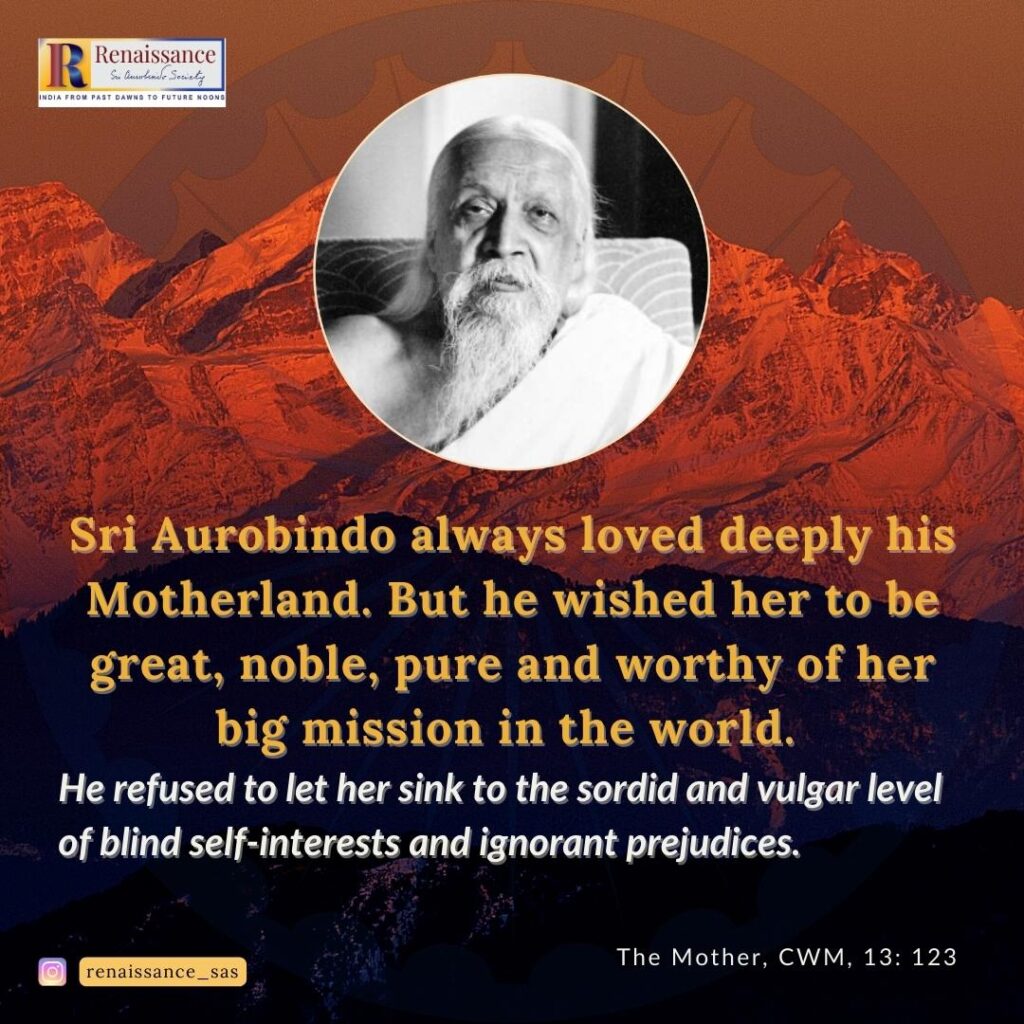
Namaste!
Greetings for this very special Darshan day, August 15, 2021, which marks the beginning of a year-long celebration of Sri Aurobindo’s 150th birthday and 75th anniversary of India’s political independence. At Renaissance, we are celebrating this special occasion by dedicating the next 12 issues to explore the 12 attributes that the Mother has identified as soul-powers necessary for the full manifestation of Her Work. These qualities are:
Sincerity | Humility | Gratitude | Perseverance | Aspiration | Receptivity | Progress | Courage | Goodness | Generosity | Equality | Peace
In a conversation dated 15th June, 1970 someone asked the Mother, “You have said in one of your messages: The number one problem for India is to find back and manifest her soul. How to find back India’s soul?” The Mother replied:
“Become conscious of your psychic being. Let your psychic being become intensely interested in India’s Soul and aspire towards it, with an attitude of service; and if you are sincere you will succeed.”
(CWM, 13: 370)
This is the essential work the Mother asks us to do for our beloved motherland, for India, our Mother. As we walk the path to a deeper knowledge of the truer self within, we must cultivate in us these 12 qualities if we aspire to become sincere servitors of the Truth, courageous children of Mother India, aspiring children of Divine Mother.
We start with Sincerity for this issue of August 2021.
In 1971, when someone asked the Mother on how to best celebrate the Birth Centenary of Sri Aurobindo, Her reply was: “Aspire and be sincere and obstinate in your endeavour,” and to “make an effort to progress in understanding.” (CWM, Vol. 13, p. 14). These words have been our inspiration and guide as we worked on the current issue.
Today the whole nation and the world are celebrating the start of the 150th birth anniversary of Sri Aurobindo. As our humble offering for this special occasion, in the Guiding Light section we feature a documentary titled ‘Sri Aurobindo – Glimpses of His Life‘ produced in 1975 by Sri Aurobindo Society. We believe that watching this film will facilitate a few minutes of delight by filling our minds and hearts, our entire consciousness, with the presence of Sri Aurobindo. The same documentary is presented in Sanskrit as well as English versions. The Sanskrit version is selected to commemorate the upcoming World Sanskrit Day on 22nd August.
Today also marks the beginning of a special year in India’s political history. It is appropriate to recall that Sri Aurobindo’s was the first voice raised to demand complete independence (pūrna swarāj) from the British. His unparalleled work for India’s freedom, while concentrated over a short period, gave the right turning and direction to the movement at the right time.
At the time when India’s political leaders were busy petitioning and appealing to the British colonial masters for minor concessions, Sri Aurobindo walked in the scene and awakened the Indians to the path of courage and boldness, and struggle and sacrifice for freedom. As he remarked in one of his writings in Bande Mataram, politics is the work of Kshatriya and it is the virtues of Kshatriya that must be developed if India wants to win and protect her freedom.
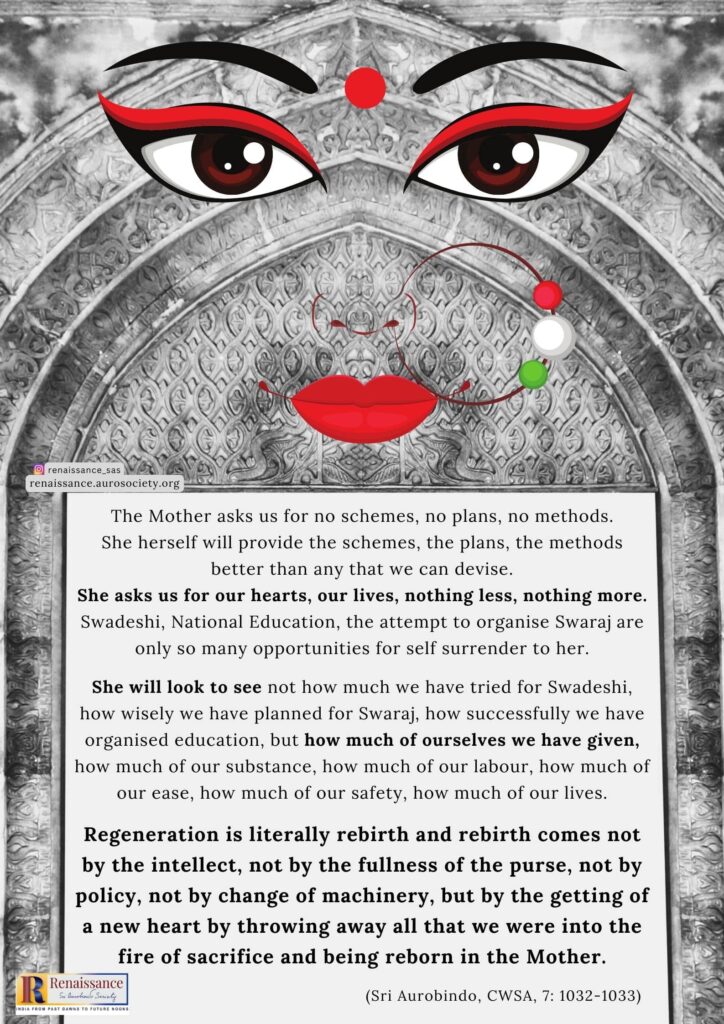
For this issue of Renaissance, we are happy to feature a very special essay by Sri Aurobindo from his Bande Mataram writings in which he writes about the birth and growth of Indian nationalism invoking the advent and avatāric work of Sri Krishna. The selection of this piece, The Life of Nationalism, as our special feature seemed most appropriate since this month we also celebrate Krishna Janmashtami.
Also see:
Nation and Nationalism — Sri Aurobindo in Bande Mataram
Sri Aurobindo, the revolutionary nationalist, arrived in the little French colony of Pondicherry on April 4, 1910, following a divine command. It was an ādesh to prepare India and Indians, the world and the humanity for a new freedom that can only come with a change of consciousness.
India’s political freedom was assured — it was Sri Krishna who in Alipore prison had assured Sri Aurobindo of this — and now the work that lay ahead was even bigger. It was a work to be done for the earth, to bring down a new consciousness which will chart a new course of evolution itself.
India got her political freedom on August 15, 1947, but along with the independence came her partition. A little over a month before that, with his characteristic wit and humour, Sri Aurobindo had written to a disciple that the spiritual force he had been putting on human affairs was the overmind force.
And when this force acts in the material world,
…it is so inextricably mixed up in the tangle of the lower world forces that its results, however strong or however adequate for the immediate object, must necessarily be partial. That is why I am getting a birthday present of a free India on August 15, but complicated by its being presented in two packets as two free Indias: this is a generosity I could have done without, one free India would have been enough for me if offered as an unbroken whole.
~ CWSA, Vol. 35, p. 368
As is well-known, Sri Aurobindo in his August 15, 1947 message had spoken of his “dream” that this partition will and must go. But what is not generally known is why this specific date August 15 was chosen for India’s freedom.
On August 15, 1950, in a special issue of the Ashram journal, Mother India, Amal Kiran had written a long essay which outlined the global significance of the date August 15. Sri Aurobindo used to see and approve all the editorials and key articles especially ones that had politics related themes, this essay too was seen and approved by Sri Aurobindo.
Here we find some very important answers to the question — why August 15, especially when we reflect on these words of Amal Kiran — “behind the conscious thought of individuals there is the working of that invisible yet potent being which is the national soul or genius.”
We are happy to republish major portions of Amal Kiran’s original essay, August 15: Its World-Significance in three parts in this special issue of Renaissance.
See our digital exhibit:
Sri Aurobindo & August 15
At Pondicherry, his cave of tapasyā , Sri Aurobindo, the mahayogi, was inwardly battling the dark forces of inconscient and subconscient planes to prepare the earth for the Supramental descent, and outwardly also keeping a close eye on the world-forces and applying his Overmental force as and when required to guide the direction of major world-events.
His was the God’s labour to bring down the Supramental Consciousness. And at the same time in his Divine Compassion as a Guru and Friend he was also lovingly guiding those near him on the path of sādhana, helping them to turn their energies toward the one change needful — change of consciousness. As he said in a letter,
. . . our attitude is that humanity cannot grow out of its limitations by the ordinary means adopted by the human mind, politics, social reform, philanthropy, etc.,—these can only be temporary or local palliatives.
The only true escape is a change of consciousness, a change into a greater, wider and purer way of being, and a life and action based upon that change. It is therefore to that that the energies must be turned, once the spiritual orientation is complete.
~ CWSA, Vol. 29, p. 43
Sincerity marks the beginning of all aspiration for a change of consciousness — sincerity in intention, in our effort and in our offering of the effort to the Divine. As the Mother once said, sincerity is the need of the hour.
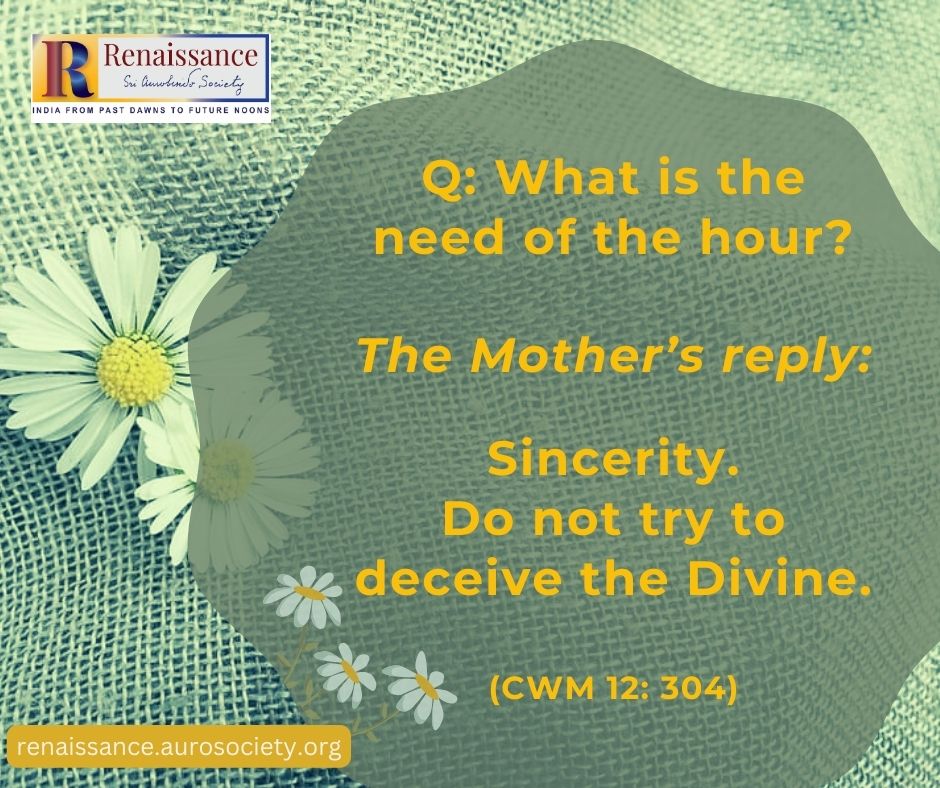
To progressively become more sincere instruments of the Divine’s work, we must constantly invoke Her help with a child-like trust and candidness. There should be no pretension, no hypocrisy, no duplicity of any kind. Life gives us countless reminders of the need to constantly become aware of those countless little, pesky flaws in our nature that stand in the way of making the inner aspiration more sincere and true and complete.
The supremely compassionate Sri Aurobindo once wrote in a letter that for a true sādhaka, all outward struggles, troubles, calamities are only a means of surmounting ego and rajasic desire and attaining to complete surrender. All these are opportunities for us to grow by experiencing the consequence of our every little insincerity. These are moments life offers us to grow in sincerity.
Be absolutely convinced that everything that happens, happens in order to give us precisely the lesson we needed, and if we are sincere in the “sadhana”, the lesson should be accepted with joy and gratitude.
For one who aspires to the divine life, what can the actions of a blind and ignorant humanity matter to him?
~ CWM, Vol. 14, p. 219
* * *
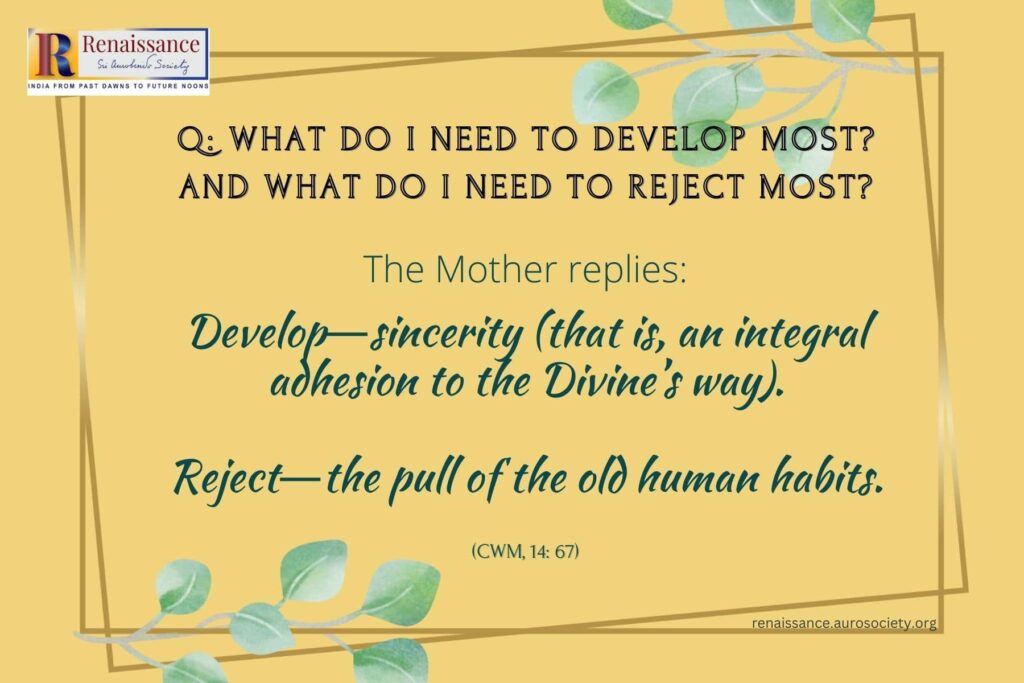
Don’t miss:
भवतु भारतम् – Prayer for India
Hymn to India
Whether it is traversing the inner or the outer paths of our journeys, sincerity is the biggest safeguard if we seek true progress. As Sri Aurobindo reminds us — what is true of the individual, is also true of the nation. This is a day when we must reflect on how sincere we are as a nation — sincere in our work for the nation, sincere in our thoughts toward the nation, sincere in our effort to identify with the nation-soul of India.
We argue and debate on nation and nationalism and their relevance in our times of globalism, but do we truly and most dispassionately reflect on what is unique about the nation that is India, the Bharat? What is the Indian view of nation and nationalism? How are we teaching our young about the past of India, the present of India and the future of India? All our work bears the shadow of our mental preferences, our favoured ideologies, our narrow perceptions, our inadequate analyses, our incomplete knowledge, our limited capacities.
In short, all this is insincerity.
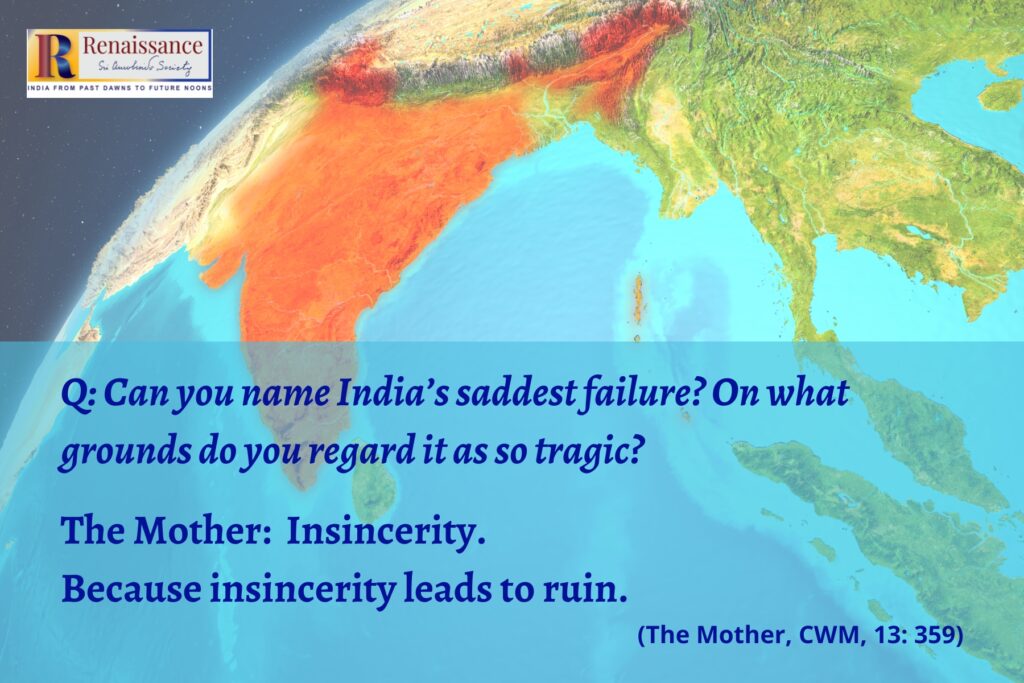
The only safeguard are sincerity, honesty and straightforwardness. But none of these are easy to acquire given the admixture of truth and falsehood that are our world and life. Only a pure, intense flame of aspiration within can help us grow in sincerity.
Also see:
O Our Mother — Invocation by the Mother
To start off our exploration of Sincerity we have another edition of the Guiding Light highlighting the Words of Sri Aurobindo and the Mother. They have insisted so much on sincerity as the biggest safeguard in all inner and outer effort for progress that it is rather difficult to decide which of their passages to leave out when editing a small journal. We have made a small attempt by categorising and organising some of their Words on Sincerity in different pieces in the issue.
In addition to exploring the place of sincerity in sādhana, there are separate pieces on the significance and ways of inculcating sincerity in the children, and also on sincerity in the realm of social-political domain. We are also highlighting a few stories told by the Mother on this very important quality of sincerity, since stories are the best way to bring to light the subtleties of the truth.
A meditative piece by Sheeba Naaz on Italian Aster, the flower symbolising sincerity, finds its place in the issue. We are hoping to make this ‘Flower Meditation’ a regular feature in all the 12 issues dedicated to 12 qualities.
Two more pieces by aspiring children of the Mother, Charan Singh and Sanjeev Patra, speak of the prime importance of sincerity in the path of Integral Yoga and how one may constantly grow in sincerity. An American educator, Maureen Hall, shares her reflections on sincerity as a means for self-development as she looks back at the time she spent at Sri Aurobindo Ashram, ten years ago.
Half way through our work on this issue, a very helpful compilation on Sincerity was generously shared with us from the offices of Mother India: Monthly Review of Culture. We are grateful for this gesture. Going through that exhaustive compilation inspired us to present some of the gems on Sincerity in a more creative manner, resulting in some digital exhibits on Sincerity.
Do check out our flipbooks:
Sincerity in Politics and Sincerity in Religion
Our two regular features ‘Insightful Conversations‘ and ‘Book of the Month’ help us explore Sincerity in another way. We speak with two young educators, Pranjal Garg and Neha Singh, teaching Indian History at the university level.
Our aim is to explore how we may begin to sincerely rethink the ways in which the subject of Indian History is presented to our youth in classrooms. This conversation takes us beyond the ordinary ideological and political debates that have plagued the discipline of Indian History and Historiography since long, and invites us to explore a more integral approach to learning and teaching of History.
In the Book of the Month, we continue with this theme of sincerity in history.
We feature excerpts from a couple of introductory chapters from a book authored by Prof. Kittu Reddy, a long-time resident of Sri Aurobindo Ashram and teacher of Indian History and Culture at Sri Aurobindo International Center of Education.
The book, as the author states, is an attempt to interpret the events of Indian history from a subjective point of view. This does not mean that external events are any less important; rather they gain greater importance when seen in the light of the inner psychological vision and deeper forces behind them.
The issue also includes next parts of our ongoing features — Sri Aurobindo on Isha Upanishad by M. P. Pandit, and सर्वे सन्तु निरामयाः – May All be Free from Illness by Rajeshwari.
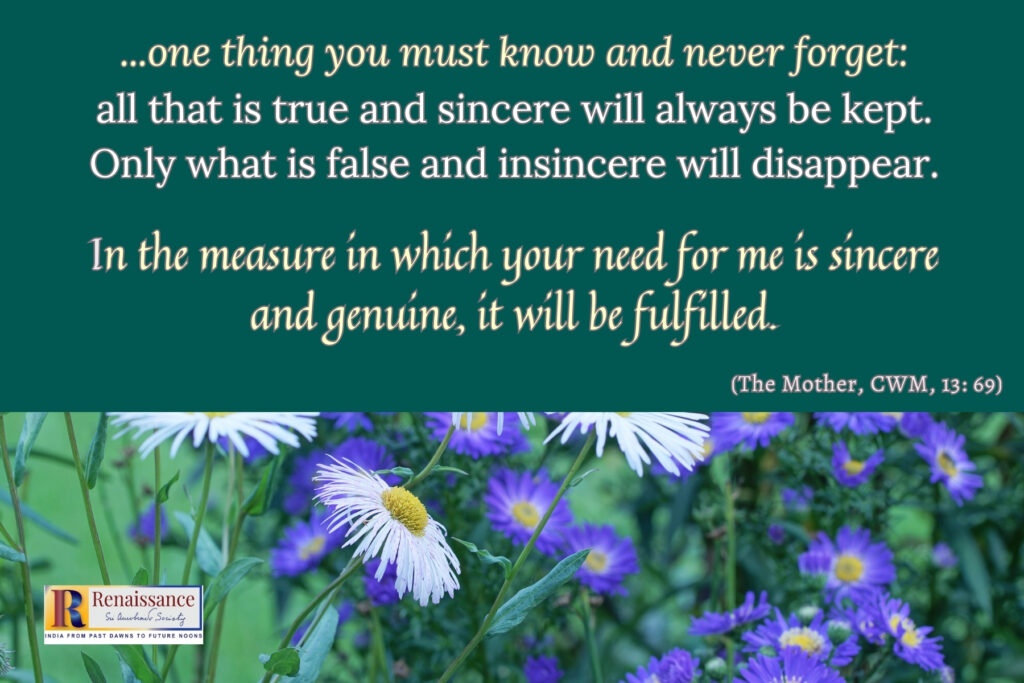
We hope our readers will enjoy going through this special expanded issue of Renaissance as much as we enjoyed putting it together. There is no better way to close this editorial than by recalling an important guidance given by the Mother, highlighting the importance of sincerity for all our written and spoken expression.
“If we allow a falsehood, however small, to express itself through our mouth or our pen, how can we hope to become perfect messengers of Truth? A perfect servant of Truth should abstain even from the slightest inexactitude, exaggeration or deformation.”
(The Mother, CWM, Vol. 14, p. 202)
The Mother had once given an assurance that in the measure in which our “need” for Her is sincere and genuine, it will be fulfilled (CWM, Vol. 13, p. 69). With sincere hearts, we offer this work at the feet of Sri Aurobindo and the Mother and pray that She may grant us more and more of this sincere need to grow in our love for Her and to progress toward Her.
In gratitude,
Beloo Mehra (for Renaissance Editorial Team)
~ Graphic design: Beloo Mehra


